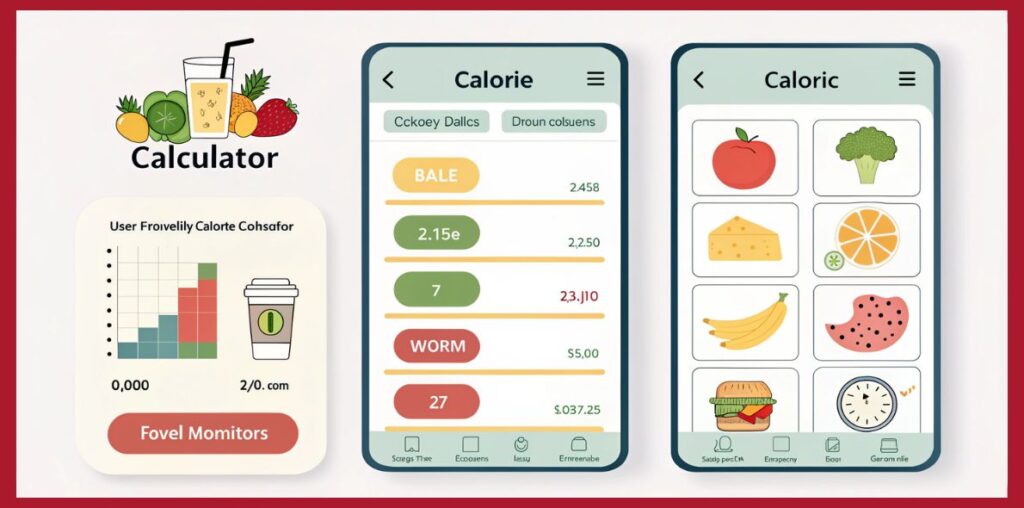🧮 Food Calorie Calculator
Search for foods and calculate total calories based on portions
Your Food Items
Start by searching and adding foods above
Browse by Category
💡 Calorie Tips
Daily Needs: Adults typically need 1,800-2,400 calories per day
Weight Loss: Create a 500-750 calorie deficit for 1-1.5 lbs/week loss
Portion Control: Use measuring tools for accuracy
Balance: Include proteins, healthy fats, and complex carbs
Best Food Calorie Calculator: A Practical Guide For Everyday Use

Understanding calorie intake is a key part of managing nutrition and health, whether you’re trying to lose weight, gain muscle, or simply maintain your current balance.
A food calorie calculator can be a helpful tool to make this process easier and more accurate. Here’s a straightforward guide to what a food calorie calculator is, how it works, and why it might be useful for you.
What Is a Food Calorie Calculator?
A food calorie calculator is a tool that estimates the number of calories in the food you eat based on portion size, ingredients, and nutritional content.
Unlike generic calorie charts, these calculators allow you to enter your specific meals or ingredients to get a tailored calorie count.
How Food Calorie Calculators Work
Most calorie calculators use databases that contain nutritional information for a wide range of foods. When you enter a food item and specify the quantity, the calculator multiplies the calorie value per unit to give you an overall estimate.
Some include additional macronutrient breakdowns such as proteins, fats, and carbohydrates, which adds more detail for those tracking nutrition beyond just calories.
What Makes A Food Calorie Calculator Effective?
Not all calculators are equal. The best ones combine a large food database with user-friendly design and reliable accuracy. Here are the qualities that set strong tools apart:
1. Accuracy of Food Data
A calculator should use verified nutritional information, ideally from sources like the USDA Food Database or official nutrition labels. Accuracy is key because even small errors can add up over time.
2. Comprehensive Database
The more foods included, the better. A useful tool should cover everything from packaged snacks to restaurant meals and fresh ingredients.
3. Portion Size Flexibility
Since not everyone eats standard serving sizes, the calculator should allow you to adjust quantities—whether it’s a handful of almonds, half a cup of rice, or a full plate of pasta.
4. User-Friendly Interface
Tracking calories should not feel like a chore. The best calculators make the process quick and simple with clear layouts, search functions, and saved food options.
5. Extra Features
Many calculators now include barcode scanning, recipe analysis, goal setting, and daily progress charts. These features can make tracking more practical and motivating.
Popular Types Of Food Calorie Calculators
There are different categories of tools you can use depending on your lifestyle.
Online Calculators
Web-based calculators are quick and don’t require downloads. They are best for occasional use or when you want a simple calorie check without long-term tracking.
Mobile Apps
Apps like MyFitnessPal, Cronometer, and Lose It! are popular because they combine calorie counting with meal tracking, fitness integration, and progress monitoring. These are ideal for people who want daily consistency.
Smart Devices and Wearables
Some smartwatches and fitness trackers include calorie calculators linked to your activity level. While not perfect for food-specific data, they give an overall picture of your energy balance.
Top Food Calorie Calculators In 2025
Here are some of the most reliable and widely used tools:
1. MyFitnessPal
Strengths: Huge database, barcode scanner, integrates with fitness apps
Best for: Everyday users who want convenience and community support
2. Cronometer
Strengths: Highly accurate, detailed nutrient breakdown, excellent for serious tracking
Best for: Athletes, people with dietary restrictions, and those interested in micronutrients
3. Lose It!
Strengths: Easy-to-use interface, goal tracking, photo-based food logging
Best for: Beginners or casual users who want a straightforward tool
4. Nutritionix Track
Strengths: Focus on restaurant and branded foods, customizable recipes
Best for: People who eat out frequently or prepare mixed meals
5. Fitbit App (with device)
Strengths: Syncs with activity tracking, balances calories in vs. out
Best for: Fitness-focused users who already own Fitbit devices
Other Applebee’s Menu
Explore seasonal specials, limited-time offers, and hidden favorites beyond Applebee’s main menu.
Explore Now →Nutrition Calculator
Find calorie and nutrition details for your Applebee’s favorites quickly with our easy tool.
Try It Now →How To Get The Most Out of A Calorie Calculator
Using the tool correctly is as important as choosing the right one. Here are practical tips:
Log consistently: Even if you don’t count forever, tracking for a few weeks can teach you a lot about portion sizes and calorie density.
Measure portions: Use a food scale or measuring cups at the beginning to understand serving sizes more accurately.
Set realistic goals: Whether your goal is weight loss, gain, or maintenance, a moderate and sustainable approach works best.
Look beyond calories: Pay attention to the quality of your food. Whole grains, lean proteins, vegetables, and healthy fats matter just as much as numbers.
Review patterns: At the end of the week, see how your intake compares to your goals. This helps you identify habits and adjust without guessing.
Common Mistakes To Avoid
Relying only on estimates: Restaurant meals or homemade dishes can vary widely. Whenever possible, use official nutrition info.
Obsessing over exact numbers: Calorie counts are estimates, not absolute truths. A small margin of error is normal.
Focusing only on calories: Nutrient quality, hydration, sleep, and exercise also impact health.
Setting unrealistic expectations: Drastic calorie cuts are hard to sustain and can harm metabolism over time.
Conclusion
The best food calorie calculator is the one that fits into your lifestyle and supports your personal health goals. Whether you prefer a mobile app with detailed tracking or a simple online tool for quick checks, what matters most is consistency and balance. Calories provide a useful framework, but lasting results come from a combination of awareness, nutritious food choices, regular activity, and sustainable habits.
If you are serious about improving your diet, experiment with a few calculators to see which feels most natural. Over time, you’ll build confidence in portion sizes, recognize patterns in your eating, and make more informed decisions. A calculator should be viewed as a supportive guide, not a strict rulebook—it gives structure, but you remain in control of your health journey.
Remember that no single tool can guarantee results on its own. The real progress comes when you use calorie tracking alongside mindful eating, adequate sleep, hydration, and exercise. With the right approach, a food calorie calculator becomes more than a number-crunching tool—it becomes a practical ally in creating a healthier, more sustainable lifestyle.
Frequently Asked Questions (FAQs)
Q1. What is the most accurate food calorie calculator?
The most accurate options are those that use verified nutrition databases, such as Cronometer or MyFitnessPal. These tools source data from the USDA and other official records, making them reliable for calorie tracking.
Q2. Are online food calorie calculators free to use?
Yes, many online calculators are free, including Nutritionix Track and MyFitnessPal’s basic version. Some apps also offer premium upgrades with advanced features like detailed nutrient tracking and custom reports.
Q3. How do I calculate calories in homemade meals?
You can enter each ingredient into a calculator and adjust portion sizes to match your recipe. Some apps allow you to create and save recipes, automatically calculating calories and nutrients per serving.
Q4. Can a food calorie calculator help me lose weight?
Yes. By showing you how many calories you consume daily, a calculator helps you create a calorie deficit if weight loss is your goal. Consistent logging paired with healthy food choices makes it easier to reach long-term results.
Q5. What is the difference between calorie counting apps and online calculators?
Online calculators are simple tools for quick checks, while apps are designed for daily tracking, goal setting, and integration with fitness devices. If you need ongoing support, apps are usually the better option.
Q6. How accurate are calorie calculators for restaurant food?
Restaurant calorie counts can vary based on portion size and preparation. Calculators give a good estimate, but actual values may differ slightly. Whenever possible, use nutrition information provided directly by the restaurant.
